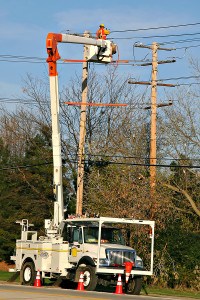The Occupational Safety and Health Administration announced that it would be issuing a final rule to improve workplace safety and health for workers performing electric power generation, transmission and distribution work.
“This long-overdue update will save nearly 20 lives and prevent 118 serious injuries annually,” said Dr. David Michaels, assistant secretary of labor for occupational safety and health. “Electric utilities, electrical contractors and labor organizations have persistently championed these much-needed measures to better protect the men and women who work on or near electrical power lines.”
 OSHA is revising the 40-year-old construction standard for electric power line work to make it more consistent with the corresponding general industry standard and is also making some revisions to the construction and general industry requirements. The updated standards for general industry and construction include new or revised provisions for host and contract employers to share safety-related information with each other and with employees, as well as for improved fall protection for employees working from aerial lifts and on overhead line structures. In addition, the standards adopt revised approach-distance requirements to better ensure that unprotected workers do not get dangerously close to energized lines and equipment. The final rule also adds new requirements to protect workers from electric arcs.
OSHA is revising the 40-year-old construction standard for electric power line work to make it more consistent with the corresponding general industry standard and is also making some revisions to the construction and general industry requirements. The updated standards for general industry and construction include new or revised provisions for host and contract employers to share safety-related information with each other and with employees, as well as for improved fall protection for employees working from aerial lifts and on overhead line structures. In addition, the standards adopt revised approach-distance requirements to better ensure that unprotected workers do not get dangerously close to energized lines and equipment. The final rule also adds new requirements to protect workers from electric arcs.
General industry and construction standards for electrical protective equipment are also revised under the final rule. The new standard for electrical protective equipment applies to all construction work and replaces the existing construction standard, which was based on out-of-date information, with a set of performance-oriented requirements consistent with the latest revisions of the relevant consensus standards. The new standards address the safe use and care of electrical protective equipment, including new requirements that equipment made of materials other than rubber provide adequate protection from electrical hazards.
The final rule will result in estimated monetized benefits of $179 million annually, with net benefits equal to about $130 million annually.
Additional information on the final rule is available at http://www.osha.gov/dsg/power_generation/. The final rule becomes effective 90 days after publication in the Federal Register. OSHA adopted delayed compliance deadlines for certain requirements.
Source: OSHA
Was this article valuable?
Here are more articles you may enjoy.

 Berkshire Utility Presses Wildfire Appeal With Billions at Stake
Berkshire Utility Presses Wildfire Appeal With Billions at Stake  UBS Top Executives to Appear at Senate Hearing on Credit Suisse Nazi Accounts
UBS Top Executives to Appear at Senate Hearing on Credit Suisse Nazi Accounts  Founder of Auto Parts Maker Charged With Fraud That Wiped Out Billions
Founder of Auto Parts Maker Charged With Fraud That Wiped Out Billions  China Bans Hidden Car Door Handles in World-First Safety Policy
China Bans Hidden Car Door Handles in World-First Safety Policy 